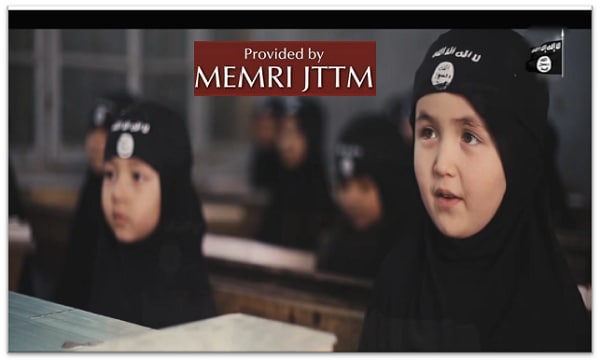The following report is now a complimentary offering from MEMRI's Jihad and Terrorism Threat Monitor (JTTM). For JTTM subscription information, click here.
On September 5, 2022, pro-Islamic State (ISIS) Telegram channel Riwaq Al-Hikmah (Pavilion of Wisdom) published an essay titled "Taliban and the Crime of Education" by someone calling himself "Sayyaf" (Executioner), criticizing the Afghan Taliban's policy of forbidding girls to attend school outside the home and arguing that it has no basis in Islamic jurisprudence.[1]

The essay begins by quoting from Taliban cleric Hafizullah Haqqani's 1997 book, "Taliban: From the Mullah's Dream to the Emirate of the Believers," which argues that the Taliban believes "that a woman is allowed to learn the matters of her religion at home [instructed] by her close relatives. But for her to go out to school or university to study worldly matters is not permitted by them." Describing the ban on girls' education as "depriving a girl of her most basic rights," the pro-ISIS channel notes that Haqqani and other Islamic scholars forbade even girls younger than eight from getting an education based on the principle of "blocking the means," according to which permitted actions are forbidden to prevent the commission of sins. In their view, learning to read and write might lead a woman to correspond with strange men, and then to "fornication and licentiousness."
Arguing that "Allah created woman like man, equal in the root of their obligations, except where there is a proof that they are different," and that hadiths prove that women can be equal to men in religious knowledge, Sayyaf notes that the principle of "blocking the means" is controversial, and that the eighth-century scholar Abu Hanifah, whose school of jurisprudence is followed by "the mullahs of the Taliban," rejected the concept. Basing his argument on Islamic jurisprudence, the ISIS supporter argues that it is not inevitable, or even likely, that a girl would correspond with strange men after learning to write, and thus girls' education should not be forbidden even by those who believe in "blocking the means." Furthermore, a man is just as likely to sinfully write to a woman, so according to the Taliban logic, boys' education should also be forbidden. Sayyaf asserts that since ignorance is more likely to lead to sin than education, instead of a girl being "deprived of her right to basic education," she should be taught that corresponding with strange men is forbidden and can lead to grievous sins, lest she be "killed after committing something which she was unaware is forbidden."
Moving to another topic, Sayyaf claims that building elaborate mausoleums, worshipping at graves, and beseeching the dead are common practices in Afghanistan, despite them being either "polytheism in themselves or lead[ing] to polytheism." However, instead of "blocking the means" to idolatry by forbidding these practices, the Taliban clerics are "the first to lead people to them and permit them to do so." The ISIS supporter concludes that the Taliban's severity in banning young girls from leaving the house for education, along with their lenience in permitting "polytheistic" practices bordering on grave worship, is the result of "whims" rather than shari'a.
The Afghan and Pakistani Taliban have reportedly closed girls' schools in many parts of Afghanistan and the tribal areas of Pakistan, and have even been accused of blowing up and torching such schools.[2] It should be noted that Taliban spokesmen have denied banning female education and claimed to have opened schools for girls in areas under the group's control.[3] After opening schools for both boys and girls in the areas under its control, ISIS highlighted its educational system in its propaganda.[4]


[1] Telegram, September 5, 2022.
[2] See MEMRI JTTM Reports: Taliban Impose Total Ban On Female Education In Pakistan’s Swat District, December 26, 2008; Taliban Militants Capture Border Village, Torch Girls’ School And Hospital In Badghis Province, December 28, 2009; Girls’ School Blown Up In Ghazni Province, May 25, 2010; Militants Blow Up Girls' High School In Logar Province, October 21, 2010; and Taliban Militants Set Fire To Girls' School In Maidan-Wardak Province, April 8, 2011.
[3] See MEMRI JTTM Reports: Interview With Taliban Spokesman Qari Yousuf Ahmadi, May 2, 2010; In Interview, Taliban Spokesman Reaffirms Jihad Until Last Foreign Soldier Leaves Afghanistan, Calls For Shari'a Criminal Law And Jihad-Based Textbooks, January 2, 2014; Urdu Daily: Afghan Taliban Take Over Schools, Hospitals And Dams In Some Afghan Provinces, December 19, 2018; and Minister Of Minerals And Petroleum Of Islamic Emirate Of Afghanistan: Taliban Have Attained "Tremendous Achievements;" Soon The World Will Recognize The Islamic Emirate; Women's Rights Will Be Enshrined In Law "In Accordance With The Laws Of Islam", April 28, 2022.
[4] See MEMRI JTTM Reports: ISIS Opens Elementary Schools In Aleppo, September 3, 2013; Jihad Fighters From The Caucasus Open School For Russian-Speaking Children In Syria, April 8, 2014; Indoctrination Of Children In The Islamic State Caliphate (ISIS), November 24, 2014; Islamic State Announces Establishment Of English–Speaking Schools, February 23, 2015; and Pro-ISIS Video: Caliphate Children Will Be Next Generation To Terrify ISIS's Enemies, March 19, 2021.
The full text of this post is available to subscribers.
Please login or register to request subscription information from MEMRI





